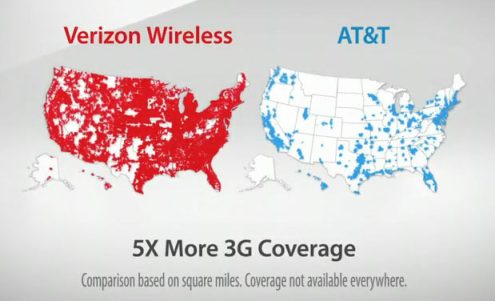 When it comes to wireless networks in the U.S. there are many claims bandied about by the various providers. Each clams to have the nation’s fastest or most reliable network; and each claim is seemingly backed up by little verifiable data for the most part.
When it comes to wireless networks in the U.S. there are many claims bandied about by the various providers. Each clams to have the nation’s fastest or most reliable network; and each claim is seemingly backed up by little verifiable data for the most part.
AT&T is the second largest wireless provider in America behind Verizon. AT&T is also one of the most maligned networks in the country thanks to what is widely perceived as a shoddy 3G network. In many cities large and small, the 3G coverage of AT&T is spotty and at times non-existent making for many irate customers. AT&T’s wireless network ranked last in customer satisfaction in a Consumer Reports study conducted in December 2009.
AT&T maintains that the poor performance in some of its markets for its 3G network is due in part the huge amount of bandwidth that iPhone wielding customers consume. AT&T has seemingly brought the ire of analysts and customers on itself and also reportedly spends less on their wireless infrastructure than Verizon and third place Sprint per customer.
PC World reports that analysts from research firm TownHall investment Research estimate that AT&T needs to spend about $5 billion on its wireless network to catch up to the coverage that Verizon offers.
TownHall reports that AT&T has spent $308 per customer on its network over the last three years compared to $353 per customer from Verizon and $310 per customer from Sprint. AT&T spends more on its wired network than it does on its wireless network according to analysts.
Ironically, the wired network makes less money for AT&T than its wireless services. AT&T is said to get 57% of its operating income from wireless and only 35% from wired services. At the same time, wireless services only get 34% of AT&T’s capital expenditure while wired services get 65%. AT&T apparently wants to change that situation though.
AT&T has asked the FCC to drop regulations that require it to support its aging wired network despite the fact that the use of the network is declining. AT&T has asked the FCC to provide a deadline for phasing out wired service around the country. If the FCC agrees, AT&T will have much more funds available for its wireless network. Whether or not the FCC will agree to the request is unknown.
TownHall’s Gerard Hallaren figures that the amount AT&T needs to spend on its network could balloon to $7 billion thanks to the need for additional backhaul capability. AT&T is already adding additional backhaul capability to its towers in preparation for rolling out its faster HSPA 7.2 service and the transition to LTE networks starting in 2011.
Hallaren says, “This is going to be a juggling act for them [AT&T].”
The iPhone has been keeping many customers tied to AT&T thanks to the exclusive deal between AT&T and Apple. That exclusive arrangement is expected to end by the middle of 2010 – at that point, many expect to see a mass exodus of customers as they move from the AT&T network .
Editors' Recommendations
- Here’s another big reason why T-Mobile 5G dominates AT&T and Verizon
- T-Mobile’s 5G Ultra Capacity network has four times the coverage of Verizon and AT&T
- 5G coverage map: Where you can get 5G on Verizon, AT&T, T-Mobile
- FAA says 50 U.S. airports won’t get expanded 5G coverage until later in 2022
- Verizon and AT&T propose 5G midband power limits to avoid aircraft interference


